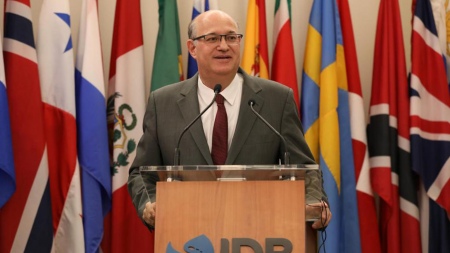the brazilian economist Ilan Goldfajn assumed the presidency of the Inter-American Development Bank (IDB) on Monday with the mission of propping up the multilateral organization and returning it the title of the main development bank in the region, and in whose management Argentina will have a high participation.
Although the formal assumption took place in Washington, the public presentation of this new stage of the IDB will only take place in mid-January. after the controversial departure of Mauricio Claver Carone.
The Brazilian came to lead the multilateral organization in a context of world inflation rarefied by the prolongation of the war in Ukraine, and after the scandal involving Claver Carone, who was dismissed last September after it was found that he favored an employee his position, with whom he also had a sentimental relationship.
IDB sources told Télam that this Tuesday at noon Goldfjan will send a formal greeting to all IDB employeeswhich will also cover all the headquarters of the organization in the region, among its first activities.
In an interview conducted before his appointment was made official, Goldfajn said that among his priorities is working in a “transparent” and prop up the image of the organizationsince “the IDB has to once again be the most important institution in Latin America”, both because of its capacity in resources and leadership.
Until last month, Goldfajn served as director of the Department for the Western Hemisphere of the International Monetary Fund (IMF) and was involved with Argentina in the approval of the extended facilities agreement, and in the first two reviews for the disbursement of funds. approved.
Today we welcome our new president, Ilan Goldfajn, on his first day at the IDB! Meet him here. #Latin America #Caribbean #ImprovingLives
— Inter-American Development Bank (@el_BID) December 19, 2022
The new head of the IDB was also president of the Central Bank of Brazil during the government of Michel Temer and trained as an economist at the Federal University of Rio de Janeiro (UFRJ), with a master’s degree from the Pontifical Catholic University (PUC) of that same city and a doctorate from the Massachusetts Institute of Technology (MIT). ).
On the other hand, for Argentina, a promising management is also inaugurated, since the economist Cecilia Todesca Bocco will represent Argentina in the Vice Presidency of Sectors and Knowledge, in the Infrastructure and Energy Management and in the new Institute of Gender and Equality. These are areas considered key by the Argentine government.
According to Todesca Bocco, the gender issue will be one of the new management axes of the IDB and was one of the “strategic issues” that Argentina presented for the nomination of candidates.
In this sense, the future gas pipeline with which Argentina will supply Brazil It is a potential project of mutual interest for both countries, something that may also be of great importance for the multilateral organization.
At the time, from the Argentine embassy in the United States, led by Jorge Argüello, they indicated that the country “will participate in the management of the new IDB with two key positions that manage 40% of the budget“.
In the election of the new head of the IDB, the vote of the United States, the support of Argentina and Brazil were decisive for Goldfjan, since between the three countries they have almost 53% of the voting power in the entity.
Argentina has a loan portfolio with the IDB that exceeds 13,000 million dollars.
A few days ago, the IDB Board of Directors approved a loan operation for 500 million dollars linked to objectives of mitigation and adaptation to the impacts of climate change.
This financing was already drawn by the body in mid-December and went on to strengthen the international reserves of the Central Bank.
As for the 2021-2023 bilateral strategy, it is structured around “four strategic pillars: poverty reduction and social protection for the most vulnerable sectors; economic recovery and productive development 4.0; macroeconomic stability and effectiveness of public policies; and digital transformation as a transversal axis of development”, according to the planning document for the coming years.

















